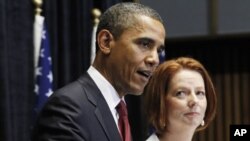The leaders of the United States and Australia have announced an agreement to maintain U.S. forces on Australian soil.
U.S. President Barack Obama and Australian Prime Minister Julia Gillard spoke to reporters about the agreement following talks Wednesday in Canberra.
Gillard said the deal called for a force of 200 to 250 U.S. Marines to be based in northern Australia for rotating six-month deployments. She said the force would grow over time to a full force of 2,500 personnel. She added that the agreement also opens Australian bases to U.S. aircraft.
Obama said the agreement will better allow the United States to respond to a range of humanitarian and disaster needs as well as security challenges.
“This rotational deployment is significant because what it allows us to do is to not only build capacity and cooperation between our two countries, but it also allows us to meet the demands of a lot of partners in the region that want to feel that they’re getting the training, they’re getting the exercises, and that we have the presence that’s necessary to maintain the security architecture in the region," he said.
Obama said the agreement will help to maintain the security architecture of the Asia-Pacific region. He said it will also make it easier for U.S. forces to train and exercise with troops from other countries across the region, and to equip smaller nations so they can respond more quickly to crises.
“It also allows us to respond to a whole host of challenges like humanitarian or disaster relief, that frankly, given how large the Asia-Pacific region is, it can sometimes be difficult to do, and this will allow us to be able to respond in a more timely fashion, and also equip a lot of countries, smaller countries who may not have the same capacity, it allows us to equip them so that they can respond more quickly as well,” he added.
Obama said with his visit to Australia, he was making it clear that the United States is stepping up its commitment to the entire Pacific region, saying "We are here to stay."
China reacted swiftly to the announcement in Canberra, suggesting the deployment of U.S. troops to Australia may not be appropriate and should be discussed within the international community.
Aides to Obama insisted there was nothing inappropriate about the plan, but the U.S. president did not answer directly when asked whether the plan was a response to China's rising military power.
Obama said the United States welcomes a rising, peaceful China, but that with its rise come increasing responsibilities. He said it is important for China to play by the rules of the road and help support an international system that has made its rise possible.
He said that when China plays by the rules, it is a win-win situation for everyone. When it does not, he said, the United States will send them a clear message that Beijing has to be on track.
He also said the notion that the United States fears China, or hopes to exclude it from international frameworks like the Trans-Pacific Partnership trade negotiations, is mistaken.
Obama flew to Australia from Hawaii, where he and Ms. Gillard both attended the annual Asia-Pacific Economic Cooperation forum.
Both will travel later this week to Bali, Indonesia for the East Asia Summit, where the United States and Russia will participate as full members for the first time.
Some information for this report was provided by AP.




